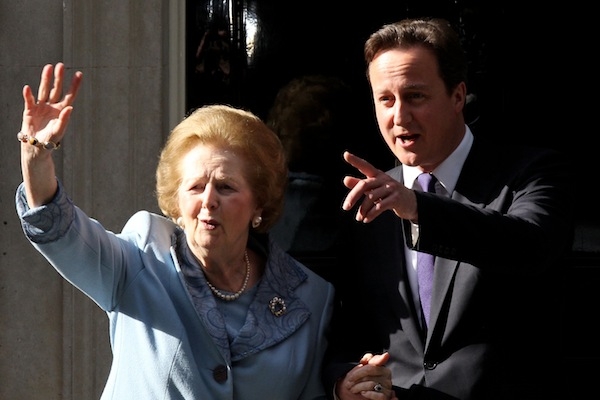Margaret Thatcher’s death has inevitably prompted intense reflection among Tories about what lessons the party should learn from her time in office. ‘We must finish the job’ is the refrain on the lips of Thatcherite ministers, and there are more of those today than there were a year ago. The experience of office has had a radicalising effect on the Cameroons. To be sure, today’s circumstances are not the same as those of 1979 or ’89. Her exact policy prescription is not what is required. This is something that Thatcher, a politician who relished fresh thinking, would have appreciated. But what the party does need is the spirit of Thatcherism, that understanding of what a centre-right party should be in the modern age.
Thatcher understood that it was not enough for a Conservative government to seek to conserve things. In a world in which change is inevitable and the Labour party, the academic establishment and the self-appointed representatives of civil society are all doing their best to move the country to the left, Conservatives have to do more than to try and hold the line. As she warned in her 1982 conference speech (arguably her best), ‘Where the left stood yesterday the centre stands today.’ This makes it imperative that, in government, the Tories move the centre to the right.
Thatcher grasped that, while Karl Marx’s political economy is wrong, there is something to be taken from his understanding of how politics works. Council house sales created a new class of property owners, privatisation a new private-sector workforce, and economic and regulatory reform empowered the entrepreneur. Cameron is, in places, trying to do something similar.
His deficit reduction plan is based around shrinking the public sector and expanding the private sector. His Chancellor and chief political strategist, George Osborne, is constantly looking for new ways to create Tory voters. But they have yet to come up with anything as dramatic or as effective as Thatcherism. Their ‘invitation to join the government of Britain’ didn’t have anywhere near the same appeal as the chance to buy your own home.
A second lesson from Thatcher for today’s Tories is that they must be the anti-establishment party. She understood that deference was dead and that a Tory party that was seen as the political wing of the elite would not win elections. She presented the Tories as the little man’s ally against big government. Even as Prime Minister, she would criticise the government and the bureaucracy, something that Steve Hilton tried and failed to persuade Cameron to do. She also rejected the cosy corporatist stitch-ups that Edward Heath had been so attracted to.
Cameron finds it harder to portray himself as an insurgent. Straight after he paid tribute to Thatcher on Monday night for ‘how she fought her way’ to power with ‘the odds stacked against her’, a close friend of his ruefully remarked that ‘it is the disadvantage of his class that he’ll never be able to say that about himself’.
His background is as establishment as they come. But his bigger problem is that he can also have a rather establishment mindset, and many of those around him share his privileged perspective. There are, to adapt Harold Macmillan, too many Old Etonians and too few Old Estonians in Cameron’s No. 10. In opposition, I remember one of his closest aides saying ‘David and Ed [Llewellyn, his chief of staff] believe that once the right people are holding the red boxes again everything will be all right.’ Too much of that attitude has been carried into government.
Thatcher spoke instinctively of ‘our people’. This term was a broader one than her critics, and some of her allies, like to admit. It described those who were meant to benefit from her reforms, many of whom were people who would not have voted Tory before.
In 2010, David Cameron didn’t have a ‘people’. Rather, he tried to be a unifying national figure. But if you are for everybody, you are ultimately for nobody. Partly out of necessity, he is trying to rectify this error. The government is now, in a phrase that Cameron and Osborne have taken to using at every opportunity, for ‘hard-working people’. This, though, needs to be more than a sound-bite. It must be the golden thread running through all their policies.
An argument will rage in the Tory party about who Thatcher’s true heirs are. This is not a debate that the modernisers should shrink from: they have a good claim to this inheritance. It is more than a coincidence that three of the most Thatcherite things that this coalition government is doing are being pushed through by the three most prominent modernisers. Michael Gove is reforming education in the way that Thatcher’s mentor Sir Keith Joseph would have liked to have done. Francis Maude, who served under her as a minister, is pursuing thrift and efficiency across government from his perch at the Cabinet Office. And Nick Boles, as planning minister, is trying to enact structural changes to the planning system which will ensure that Britain remains a property-owning democracy. These agendas are all characterised by a very Thatcherite impatience with the established order and a willingness to challenge entrenched interests.
It is testament to Margaret Thatcher that the 2010 intake was the most Thatcherite set of Tories yet elected. It is also, appropriately, the most socially diverse. I suspect that it is from this group that Britain’s next Thatcheresque prime minister will come. That may be her final triumph.







Comments